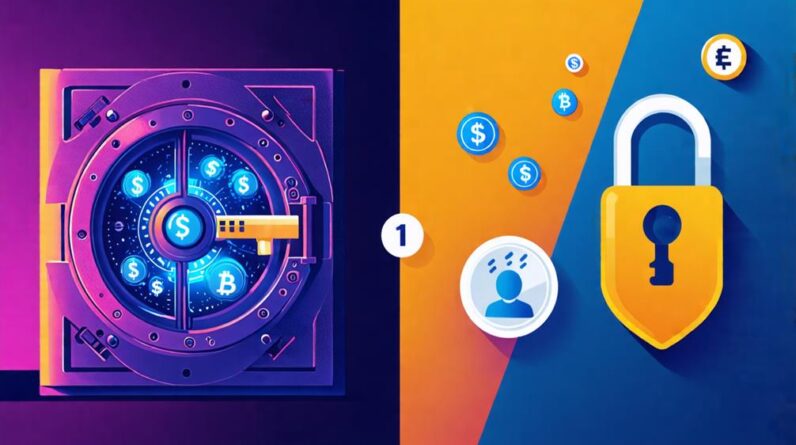
Custodial wallets offer an easy way to manage cryptocurrencies, especially if you're a beginner. They feature user-friendly interfaces and often include recovery options for lost access. However, you'll be relying on a third party to secure your assets, which can expose you to risks like hacks or insolvency. Additionally, you may face higher fees and reduced anonymity due to KYC regulations. It's crucial to weigh these pros and cons based on your experience and security needs. If you want to explore the best options for your situation, you'll find more insights just ahead.
Table of Contents
Understanding Custodial Wallets
Custodial wallets are services that manage your private keys, making it easier for you to access and use your cryptocurrency without the hassle of handling security yourself. These third-party services provide a layer of convenience, particularly appealing in the rapidly evolving cryptocurrency space. With user-friendly interfaces, they cater to beginners who might feel overwhelmed by the complexities of private key management.
However, while custodial wallets simplify access to funds, they come with inherent risks. The reliance on a third party means you're vulnerable to potential asset loss due to hacking incidents or provider insolvency. Additionally, these wallets often adhere to regulatory compliance measures, like Know Your Customer (KYC) policies, which can restrict your anonymity during transactions.
It's essential to weigh these factors when considering custodial wallets. They offer a streamlined experience and customer support but require you to place trust in the service provider's security measures. Understanding the balance between convenience and risk is key to making informed decisions in your cryptocurrency journey. Ultimately, you need to assess whether the benefits align with your personal preferences and investment strategy.
Advantages of Custodial Wallets
Often regarded as a go-to choice for newcomers, these wallets provide a seamless and user-friendly way to manage your cryptocurrency assets. With custodial wallets, you get a blend of convenience and security that makes your digital journey smoother.
- User-friendly interfaces: Designed for simplicity, these wallets require no technical expertise.
- Recovery options: Easily restore your account through security questions or customer support.
The lower initial costs of custodial wallets mean you can start trading without breaking the bank. Plus, many of them don't charge transaction fees, making them cost-effective for frequent transactions. You'll also enjoy integrated features that allow easy access to exchanges and decentralized applications (dApps), streamlining your buying, selling, and trading experiences.
Disadvantages of Custodial Wallets

Relying on a third-party custodian for your crypto assets can expose you to significant risks, including potential hacks and loss of control over your funds. With custodial wallets, you hand over your private keys to someone else, which means you're vulnerable to security breaches that could result in substantial losses—billions are lost annually to such incidents.
You also face limited control over your funds. If the custodian experiences outages or service interruptions, you might be unable to access your assets. Additionally, custodial wallets often come with higher fees due to the services provided by these third parties, gradually eating into your profits.
Another major concern is user anonymity. Most custodial wallets require KYC and AML verification, compelling you to share personal information that could be at risk during a security breach. Finally, if the custodian faces insolvency, you could lose access to your funds altogether, highlighting the inherent risks of outsourcing your asset management. While custodial wallets may offer convenience, balancing these disadvantages against their benefits is essential for any innovative crypto enthusiast.
Comparing Custodial and Non-Custodial Wallets
When choosing between custodial and non-custodial wallets, understanding how they differ in control, security, and convenience is essential.
- User Control: Non-custodial wallets give you full control over your private keys, while custodial wallets rely on third parties, like crypto exchanges, to manage them.
- Security Measures: Although custodial wallets often implement robust security measures, such as multi-factor authentication, they still face risks from hacks and insolvency. Non-custodial wallets eliminate these third-party risks.
Making the Right Choice

Choosing the right wallet depends on your experience level, security needs, and how much control you want over your assets. If you're a beginner, custodial wallets might be your best bet. Their user-friendly interfaces simplify cryptocurrency management, allowing you to engage with the crypto world with confidence. However, this convenience comes with a trade-off: you'll need to trust third-party providers to manage your private keys and digital assets securely.
Consider the security measures these custodians implement, like multi-factor authentication and cold storage, which can greatly reduce risks from hacks. Nonetheless, be aware that transaction fees can be higher due to the involvement of these services, possibly impacting your trading profitability.
It's also essential to assess the regulatory compliance of custodial wallet providers. Understanding their adherence to local regulations can give you a clearer picture of the legitimacy and security surrounding your assets. Ultimately, weigh your need for convenience against your desire for control. If security and trust are your top priorities, custodial wallets can provide a solid foundation for your cryptocurrency journey.
Conclusion
To conclude, custodial wallets offer convenience and ease of use, making them a great choice for newcomers to cryptocurrency. However, you should consider the risks, such as potential loss of control over your funds. Weighing these pros and cons against your personal needs will help you decide if a custodial wallet is right for you. Whether you value security or simplicity, make sure you choose a wallet that aligns with your goals and comfort level.







